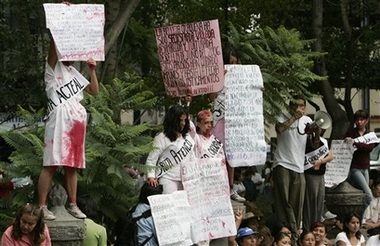Amazon.com and other stores are currently selling a “toy” called “The Rapist No. 1 Doll,” modeled after a character in the new Tarantino/Rodriguez film Grindhouse, which is a torture porn film that shows graphic male sexual violence and sexualised torture against women. [more on the rising popularity of “gornos” here]
For details on how to send protests to the companies, see this post; as mentioned there:
The availability of the so-called toy Rapist Number One … demonstrates so clearly the links between the prevalence of rape and sexually violent films and pornography. The purchaser of the toy will not necessarily commit rape, but his acquisition legitimates rape. His action, and the availability of this toy, sustains a culture in which rape and sexual violence are not taken seriously; in which sexual violence is normalised and legitimated. We may not have the empirical evidence which clearly shows that watching violent porn makes someone commit rape, but the fact that this film has spawned this sort of merchandise, sold as a “toy”, should tell us all we need to know about the harmful nature of this sort of material.
Rape Crisis England and Wales
Rape Crisis Network Europe
RAINN
update: Amazon.com and youbuynow.com are no longer selling the doll.
When told that I will cancel my account because after their initial response to my complaint (response which was all along the lines of “our goal is to provide customers with the broadest selection possible so they can find, discover, and buy any item they might be seeking”), I
*don’t* feel like my concern has been addressed and I don’t agree that Amazon needs to ‘represent a wide spectrum of opinions on a variety of topics’ when that ‘topic’ is normalizing rape. It’s not a freedom of expression matter, rape is a crime and material that promotes it discriminates against people, like material that promoted pedophilia would, for instance – and you wouldn’t invoke the same excuse for selling pedophilia promoting items, would you?
Amazon.com says they’re “very sorry if offering the Grind House Rapist doll offended you in any way, shape, or form. Let me assure you that Amazon.com does not support or promote hatred or criminal acts and customer feedback provides us an opportunity for improvement. … we are no longer offering this product for sale in our catalog”; however, Amazon.co.uk still lists the doll – they have renamed it but you can still search for it under “rapist.”
And You buy now expresses the “hope that our apology for any rudeness [from customer service representatives who reacted inappropriately to complaints, suggesting rape isn’t a “real problem with actual, quantifiable effects on society”] and the removal of the action figure will satisfy those that we offended” but makes sure to stress the fact that the intent of the doll was misinterpreted by those who felt it was promoting rape.
As we know, “Whatever you do, don’t figure out that it’s systematic.”

